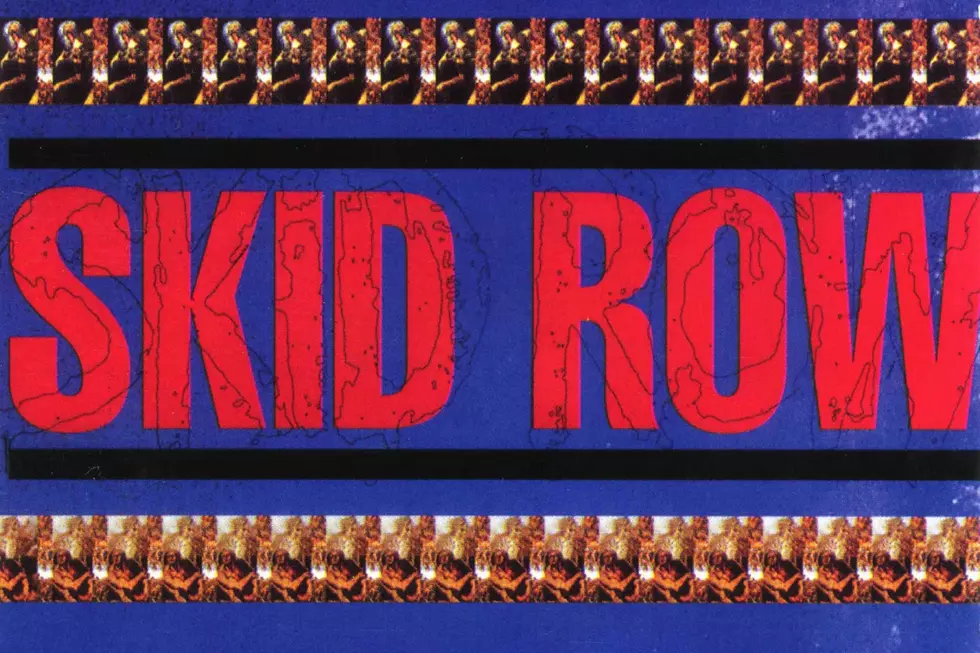
Why ‘Subhuman Race’ Tore Skid Row Apart From Sebastian Bach
Skid Row may have seemed like just another hair metal band when they broke out with their self-titled multi-platinum debut LP. But as they proved with their follow-up effort, 1991's Slave to the Grind, they were more interested in heavy riffs than pop hits — and it was that commitment to rock that helped keep the band from getting caught up in the roster churn that derailed so many of their peers' careers after grunge roared up in the '90s.
But even if they still had a record contract — and a label that wanted them to fulfill it — that didn't necessarily mean the members of Skid Row felt the respect of the rock community as they re-entered the studio to start work on what would become their third LP, Subhuman Race, which was released on March 28, 1995. In fact, as frontman Sebastian Bach argued in an interview with Circus that year, they were just another in a long line of bands who'd found success in spite of metal's spot in the cultural margins.
"Heavy metal and hard rock have always beaten up. When I was selling four million copies of a record in ‘88-‘89, all I heard was, 'Hey, pretty boy, blah blah,' so that was no good. Then when Slave to the Grind debuted at No. 1, 'Oh, that’s too heavy,' so that was no good," Bach shrugged. "It’s always something. I think hard rock stands the test of time more than any other genre."
Bach's bond with his bandmates, on the other hand, was proving far less durable. Admittedly burned out after a pair of long tours in support of Skid Row and Slave to the Grind, the group took some time off between albums before starting work on Subhuman Race, releasing the covers EP B-Side Ourselves in late 1992 and staying out of the studio until 1994. Even then, according to bassist Rachel Bolan, the label ended up nudging them back to work too soon; with relationships between the band members starting to fray, it was difficult to get any work done.
"That record was a nightmare," grumbled Bolan during an interview with Metal Exiles. "Internally the band had fallen apart, but we were forced to go in and do another record."
Compounding the group's internal stresses was a change in producers, from Michael Wagener to Bob Rock. "We worked with someone we had not worked with before after being so successful with Michael, and we were used to the way he did things. I'm not slighting Bob at all, he's a genius producer," insisted Bolan. "It was bad timing. I did not have the greatest time, it was nobody's fault, it was just the way things were. Also, the record absolutely sucks."
While Subhuman Race didn't do anywhere near as well as either of its predecessors, topping out at No. 35 on the charts and spawning only one mildly successful single with "Into Another," Bolan's assessment might be overly harsh; in fact, although it was released into a harsh climate for metal bands, the album went gold and garnered decent reviews, with a number of critics showing respect for the way Skid Row continued to get heavier instead of angling for the pop charts or trying to glom onto grunge. Still, Bach admitted that Rock may have had an undue influence on the group's sound.
"He changed things," Bach later said of Rock's work on Subhuman Race. "I remember him saying, ‘Everybody knows you can scream, Sebastian,' and suggesting I sing like Scott Weiland. Why don’t you just take a thoroughbred racehorse and hit him on the f---in’ kneecap with a baseball bat? I do like that album, but it’s not a fun record."
Looking back, Bolan admitted that Subhuman Race wouldn't have been fun regardless of who happened to be behind the boards. "No one really wanted to be there. We wrote songs halfheartedly, kinda," he told Arf Magazine. "It was more of a commitment to get a new record out than really wanting to do it. I knew when we went to the studio that this was gonna be our last album with this lineup. I just had that in my gut."
Watch the Video for 'Into Another'
Bolan's gut was correct. As they had after the tour for Slave to the Grind, Skid Row needed a breather when they completed their promotional rounds for Subhuman Race — only this time, it would end up being a much longer break than before, and when the band finally returned, it would look and sound different.
"That record just went in such an opposite direction than I saw it going and I just wasn’t crazy about it," Bolan told The Great Southern Brain Fart. "We did a small tour in the states, a small tour in Europe and then went to South America. That was it. We were done. After we came back from South America, I remember us looking at each other and going in five different directions and getting in five different cars to go home."
Subhuman Race would prove to be Bach's final album with Skid Row. As he later told Legendary Rock Interviews, he was "100 percent fired" the following year due to a disagreement over the band's creative direction — as he put it, "I thought we should be doing material that stands next to 'Youth Gone Wild' or 'In a Darkened Room,' not stuff that was okay. ... They sent me some new music and I told them straight up that I didn’t like it and I wanted us to write some more because I wasn’t going to sing those songs."
Ultimately, while the split with Bach led to a prolonged hiatus for Skid Row, it's been fairly productive for both sides. Bach made his solo debut with Bring 'Em Bach Alive! in 1998, while the band reformed in 1999 with new singer Johnny Solinger — a union that's produced a pair of full-length albums and two EPs. In 2014, both Bach and Skid Row released new music, with his third solo studio effort, Give 'Em Hell, arriving months before his former band's Rise of the Damnation Army – United World Rebellion: Chapter Two EP.
Still, like countless acts that have weathered a high-profile split, both Bach and the current Skid Row lineup will probably never stop facing questions about possibly getting back together — and although Bach has publicly signaled a willingness to do something together in honor of their brief chart reign, a reunion still seems awfully unlikely.
"I would love to do something," Bach said in 2014, when he was asked about the potential for any events or reissues celebrating the 25th anniversary of Skid Row's debut. "My former bandmates are like, ‘Nah, we’re playing a bowling alley. We’re happy. We don’t care.’"
Meet the New Boss: Rock's Replacement Singers
More From Ultimate Classic Rock









